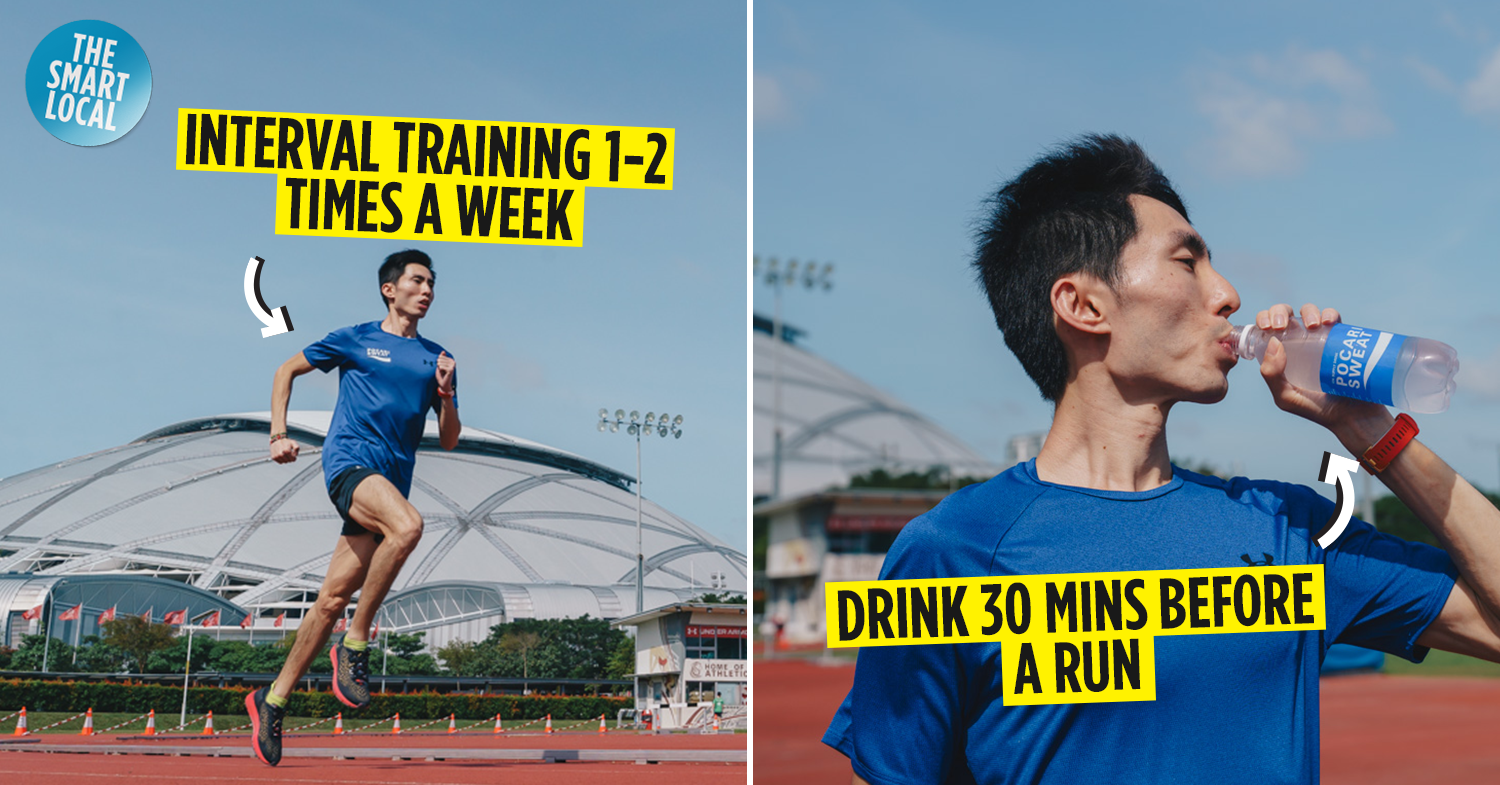IPPT running tips
“ORD lo” is what NSMen love to say whenever it comes to avoid talking about army-related matters. But if there’s something we can’t escape from, it’s yearly reservists and IPPTs. Thankfully, there are incentives for passing your IPPT, namely a $500 reward for attaining gold.
Fortunately or unfortunately, a whopping 50/100 points are based on the 2.4KM run, so you’ll need to do well to pass or even have a shot at gold. If you want to improve your timing by leaps and bounds, here are eight IPPT running tips from Singapore’s top marathoner, Soh Rui Yong, who holds the national record for 10KM, 21KM and 42KM.
1. Practise your pacing through interval training

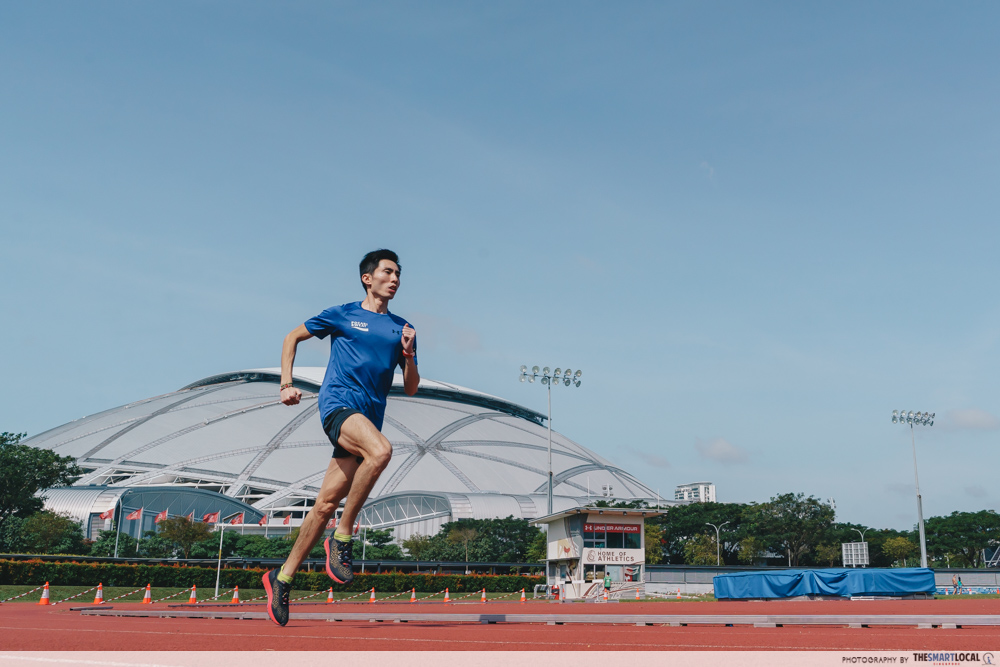
The best way to train for 2.4KM is actually not by running long distances, but by pushing yourself with a method called interval training. But wait, doesn’t long distance training improve your stamina too? Well yes, but according to research journals, interval training is much more effective, especially for shorter distances like 2.4KM.
Interval training helps to improve your maximum VO2, which is the rate at which your body can utilise oxygen, while also conditioning your body to run at your target pace. You don’t wanna be one of those step runners who sprint the first half and then lose all their momentum during IPPT.
According to Rui Yong, his interval training consists of six to 10 400M intervals with a 1 – 2 minute recovery jog in between. If his goal is to complete 2.4KM in 10 minutes, he would aim to complete each 400M interval in 1 minute and 40 seconds – a pace that’s almost close to a sprint.
Pro tip: Beginners should try to complete six sets of intervals within a target time of their choice. As you get fitter, aim to progress towards 10 sets so you’ll be more than prepared to slay your IPPT.
Recommended interval trainings per week: 1-2
2. Build muscle memory by running 2-3 times a week

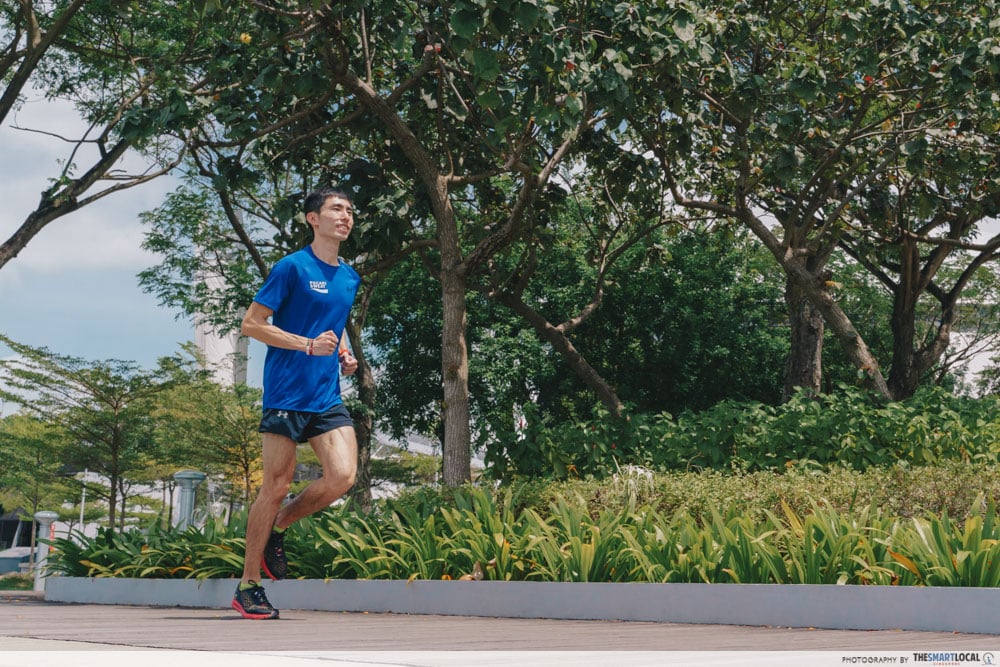
While interval training is the most effective way to make you a faster runner, easy long distance runs are not to be neglected as they provide an aerobic base to complement your training. As the name suggests, these runs aren’t too taxing and still allow for casual conversation while you’re running.
For beginners, it’s recommended to run for 30 – 50 minutes each time, without too much emphasis on the distance covered as it depends largely on your fitness level. So if you want to at least pass your 2.4KM IPPT, the average NSMan should go on easy runs at least three times a week.
Recommended easy runs per week: 2-3
3. Allow yourself 1-2 days of rest & recovery in between runs
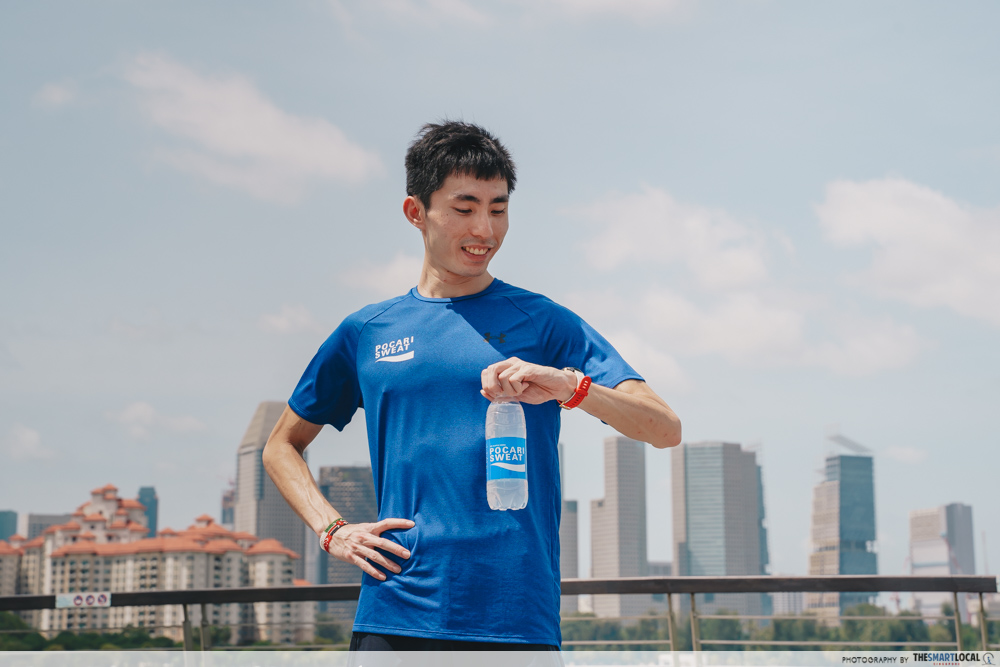

Having ample rest is also an important factor when it comes to improving your fitness level. As a general rule, allow yourself to have one or two days of rest and recovery between your runs.
If you’re unsure what training plan is best for you, Rui Yong says a good start for beginners would be to have one interval session a week on Wednesdays, and easy runs on Mondays and Fridays. You could throw in an optional easy run over the weekend too.
If you’re already someone who exercises regularly but has yet to incorporate running into your training, adding in one easy run and one interval session a week will improve your stamina greatly.
4. Stretch & warm-up to feel less tired
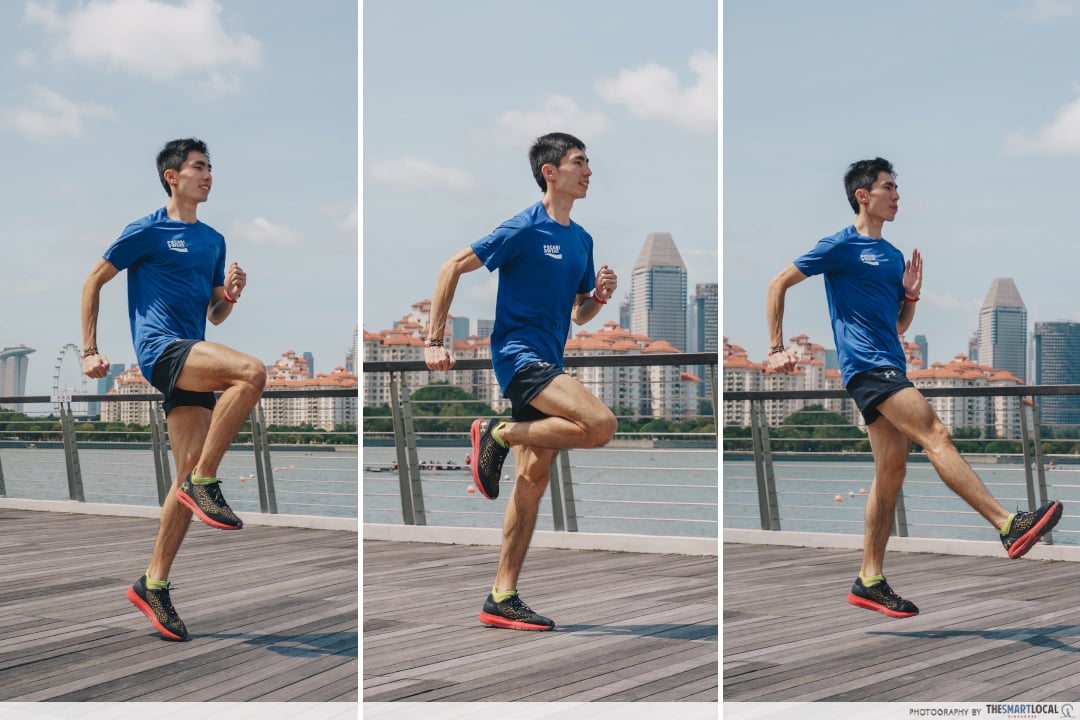

High knee lifts, butt kicks and straight leg warm-ups are good to do before a run.
Most of us would know that stretching and warming up is vital prior to any physical activity. Dynamic stretches and activation drills such as butt kicks, high knee lifts and straight leg warm-ups help you loosen up the body before exercise. This in turn enhances performance and minimises risk of injury. It also mentally prepares you for the training session.
Ideally, warming up should be done 30 minutes before an interval session or 5 minutes before an easy run, provided you have no injuries. On IPPT day, stick to the same warm up routine and mentally prepare yourself so you won’t be too nervous during the run itself. Take some deep, controlled breaths if you need to calm your nerves.
5. Monitor your hydration levels to avoid stitches


Keeping your hydration levels can be a little tricky – drinking too much may cause a bloated stomach or stitches, while drinking too little may lead to dehydration. That’s why it’s important to incorporate similar hydration cycles during training and the IPPT test itself.
During exercise, our bodies need more than just water to replenish and balance our body fluids. When we lose body fluids as we sweat, we also lose ions such as magnesium and natrium that are beneficial for our bodies.
Rui Yong suggests drinking a 500ML bottle of Pocari Sweat at least 30 minutes before exercise and only small sips thereafter in between interval runs to replenish your body.
When to drink: Before and after exercise, between intervals.
6. Get the shoes best suited for your feet

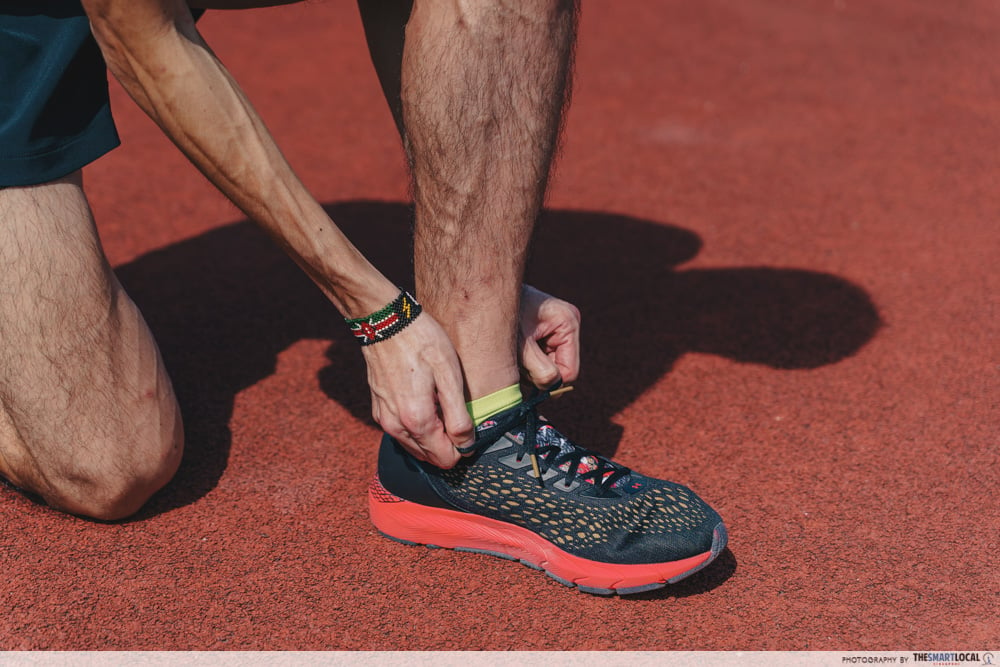
Choosing the appropriate running shoes can make or break your running experience, so it’s crucial to pick the right one.
When buying a running shoe, you’ll need to ensure the right fit to prevent discomfort and blisters. Generally, you should have enough wiggle room for your toes, at least half to a full thumb’s width of space from the tip of your big toe to the tip of the shoe.
Don’t be shy to have your feet measured for shoes that fit right, as your feet can actually change over time due to factors like weight loss or lifestyle changes. Bring along a pair of socks or inserts that you normally use, and try different shoe models to get the best fit.
7. Opt for a healthy diet of good carbs


Image credit: Eatbook
As they say, “you are what you eat”. If you want to be in tip-top condition for your 2.4KM runs, you’ll need a healthy diet rich in carbohydrates that includes things like pasta, fruits, vegetables and brown rice. This keeps your body fit while allowing you to power through training sessions.
That said, one should not be stuffing their mouths with carbs just before a run as you’ll run the risk of having a bloated belly. It’s recommended to have your last proper meal at least three hours before a run and consume small servings of food thereafter to keep energy levels up.
If you’ve ever been to a marathon, it’s not uncommon to see runners having a banana before the run. This is because bananas are light on the stomach and rich in potassium which reduces the risk of cramps and stitches. As such, it’s a good idea to bring a small snack pack with a banana and an isotonic drink to consume 30 minutes before your 2.4KM IPPT.
8. Consider cross-training for other parts of your body

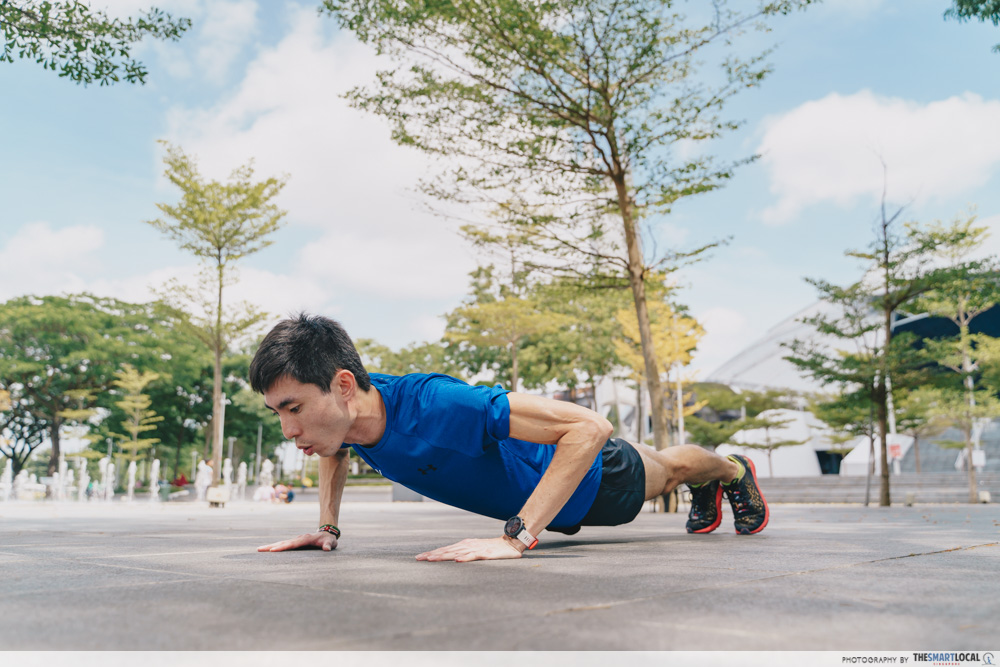
While you’re at it, consider working on other parts of your body to strengthen your overall fitness. This can be done easily by participating in other sports or doing workouts at the gym. Basic workouts like push-ups and sit-ups are great too since you’ll need to do it for IPPT nonetheless.
Go for gold and hydrate with POCARI SWEAT sachets in 3 steps


One of the key components to improving your timing in 2.4KM is to have a good hydration routine alongside your training plan. As you exercise, your body loses a lot of water through sweating, so you’ll need to balance your body fluids.
With Pocari Sweat, you can hydrate yourself much quicker than just drinking water. Not only does it contain essential electrolytes, Pocari Sweat also has a similar composition to your body fluid, which allows for quicker absorption and longer retention of these nutrients.
If you’re looking for a hydration solution that can easily slip into your pocket, the Pocari Sweat sachets are the go-to to replenish your hydration level. Here’s how you can hydrate easily in three steps with the Pocari Sweat sachets:
1. Tear open a sachet and pour it into your water bottle

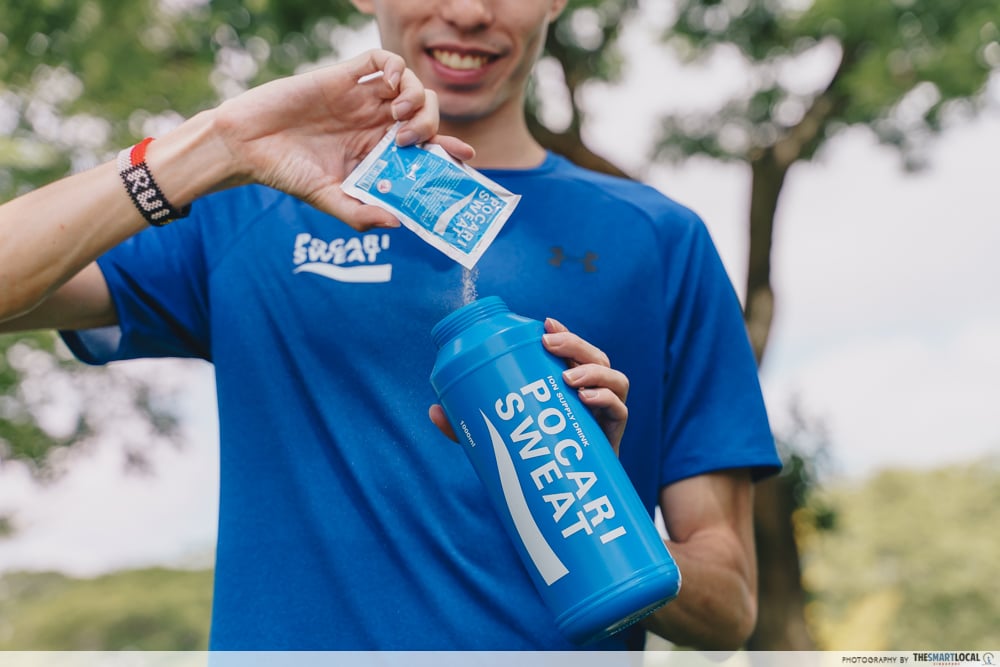
2. Fill your water bottle up with water

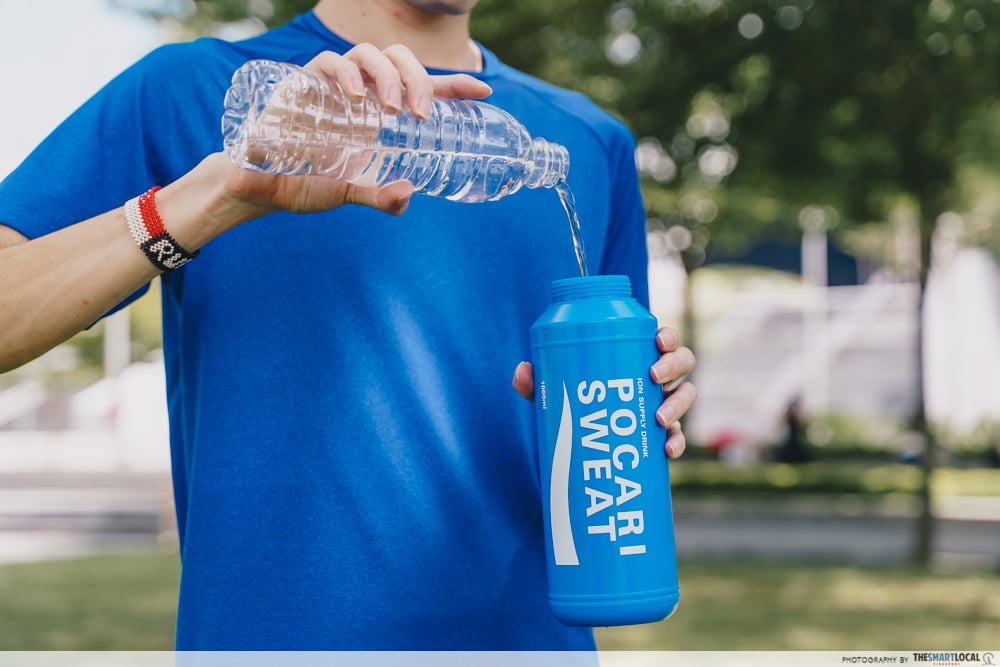
3. Drink Pocari Sweat to hydrate your body
From 1st March 2021 onwards, you’ll receive a free Pocari Sweat Sports bottle if you get $12 worth of Pocari Sweat or ION Water at any participating FairPrice or Sheng Siong outlet, while stocks last. So arm yourself with these sure-fire tips and gear up with Pocari Sweat as you gun for gold.

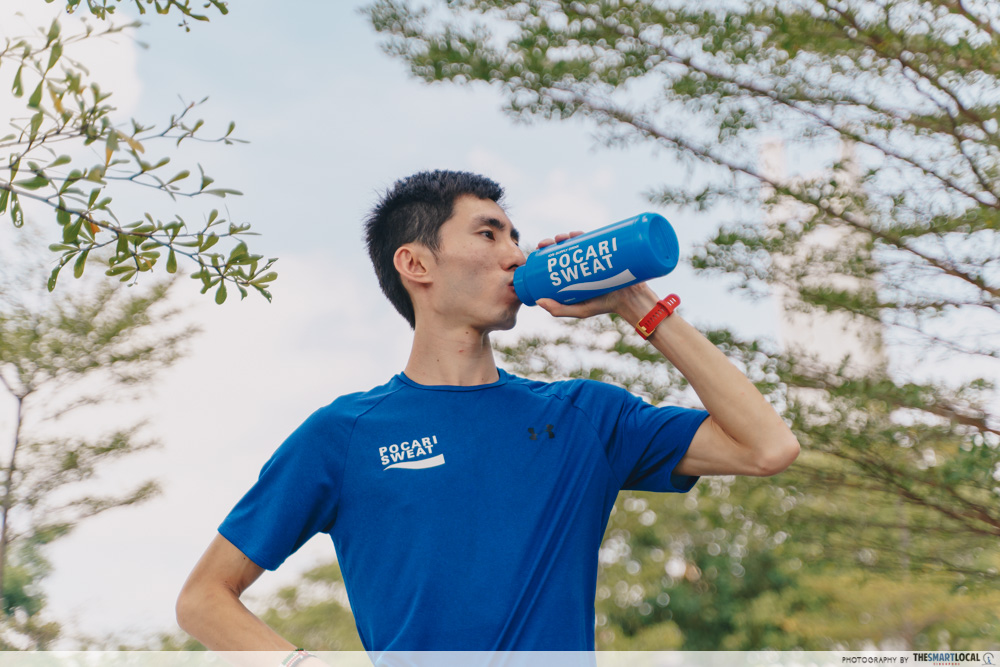
If you need some inspiration to kick-start your fitness journey, you can also check out Pocari Sweat’s Facebook page or follow @pocarisg on Instagram for sports-related guides.
Find out more about Pocari Sweat’s promotion here
This post was brought to you by POCARI SWEAT SG.
Photography by Nadia Loewito.
